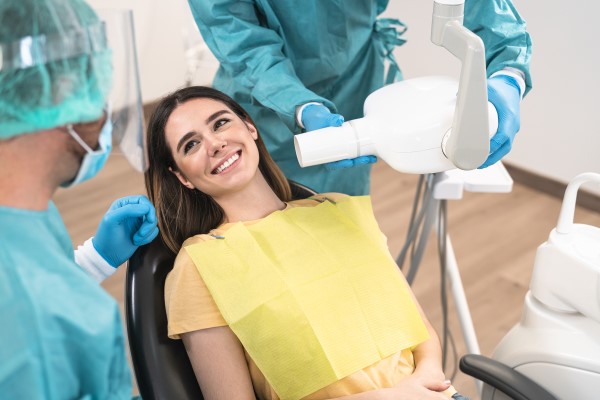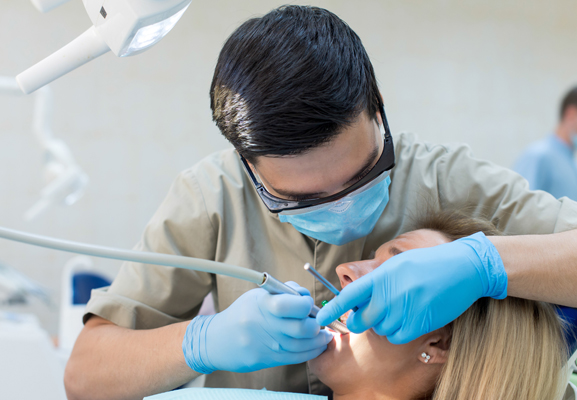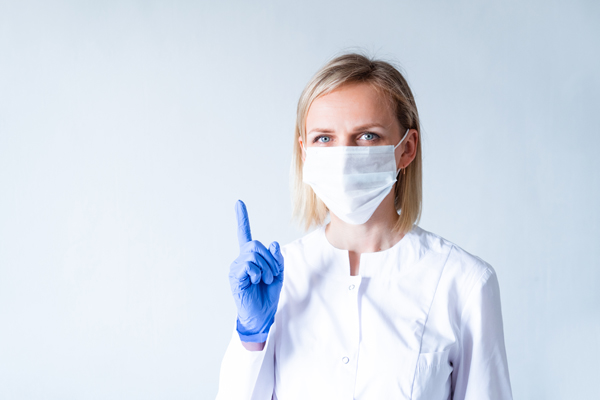FAQs about PPE per CDC Guidance — Family Dental Care of Chicago

PPE per CDC guidance is unique wearable coverings designed to protect dental professionals in Family Dental Care of Chicago from exposure to infections, such as the coronavirus. The PPE is worn during dental procedures and when cleaning sterilizing dental instruments. This article answers some questions about PPE per CDC guidance.
What is PPE?
PPE means personal protective equipment and it is meant to stop cross-infection between dental health care personnel and patients. PPE per CDC guidance typically includes face masks, gloves, protective eyewear, face shields and protective clothing such as a jacket, lab coat and reusable or disposable gown.
When is a surgical mask worn?
Dental professionals wear a surgical mask that protects their nose and mouth during dental procedures, which may generate aerosols, sprays of blood or body fluids. Additionally, surgical masks protect the dental professional when cleaning instruments manually. A surgical mask also shields patients from microorganisms expelled by the wearer. The surgical mask is replaced between patients or during a procedure if it gets wet.
When do dentists wear eyewear?
Dental healthcare professionals wear protective eyewear with side shields or face shields during any procedure that will probably generate spatter of debris or sprays of body fluids or blood. Reusable protective eyewear should be cleaned with water and soap, and when visibly contaminated, disinfected before next use.
When is protective clothing necessary?
Dentists wear protective clothing such as jackets and gowns to prevent contamination of regular clothing and to shield the skin from exposure to body fluids and blood. Sleeves should cover the forearms. The protective clothing should be replaced if it gets visibly contaminated by body fluids or blood. The protective clothing should be taken off before leaving the dental office, according to PPE per CDC guidance.
Are surgical masks sterilized for reuse?
Surgical facemasks are considered an important part of PPE per CDC guidance. As the FDA notes, surgical masks are not created for multiple uses. If the mask gets contaminated or damaged, or if it becomes harder to breathe through the mask, it should be removed, safely discarded and replaced with a new mask.
A single-use mask is disposable and designed to be used for a single procedure. It should not be reprocessed and used for another patient. If there are no reprocessing instructions for the device, it should be treated as single-use and disposed of properly, regardless of labeling.
Why do dental professionals wear gloves?
Gloves are an important part of PPE per CDC guidance. Dental professionals wear them to avoid hand contamination when touching blood, saliva, mucous membranes or infectious materials and to minimize the risk of transferring microorganisms on their hands to patients during patient care. Gloves are single-use only and should be disposed of properly after use. Hand hygiene is important after removing the gloves.
Does wearing gloves remove the need for handwashing?
No, it does not. Gloves can be compromised or torn during use, and hands can become stained when removing the gloves. Also, bacteria can multiply quickly in humid environments under the gloves. Therefore, dental professionals will ensure their hands are dry before wearing gloves. Hand washing should be done immediately after removing gloves.
Wearing PPE per CDC guidelines
When a dental emergency occurs and additional questions regarding PPE per CDC guidance arise, contact the dental office for more information.
Request an appointment here: https://www.yourfamilysmiles.com or call Family Dental Care of Chicago at (773) 250-1194 for an appointment in our Chicago office.
Check out what others are saying about our services on Yelp: Read our Yelp reviews.
Recent Posts
Cosmetic dentists focus on improving the appearance of teeth while maintaining oral function. Whether addressing discoloration, misalignment, or structural damage, modern cosmetic treatments enhance the beauty of a smile. With technology and material advancements, cosmetic dentists offer treatments that improve aesthetics and contribute to long-term wellness.One of the most sought-after cosmetic dental treatments is professional…
An emergency dentist is vital when unexpected dental problems arise, providing immediate care to address pain, damage, and other urgent issues. Comparing an emergency dentist to an oral surgeon is important for understanding which professional can best meet a patient's needs. While both play critical roles in maintaining oral health, their training, focus, and treatment…
Orthodontics is a holistic way to improve the look and function of teeth. Orthodontic appliances exert steady and gradual pressure to improve the alignment of the teeth. Common appliances are braces, which do most of the heavy lifting for patients with moderate to severe malocclusions.Do you think that your child needs orthodontics? Keep going to…
Choosing dental implants is a great idea if you are looking into your tooth-replacement options because you are missing one or more of your teeth. This option is one that offers benefits that other replacement options do not, which is why so many patients are choosing implants to replace their missing teeth. Other replacement options…


